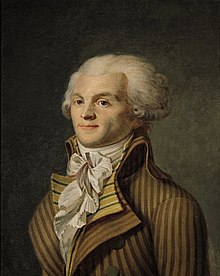Maximilien de Robespierre
| Maximilien Robespierre | |
|---|---|

Robespierre c. 1790 (anonymous), Musée Carnavalet, Paris
|
|
| Member of the Committee of Public Safety | |
|
In office 27 July 1793 – 28 July 1794 |
|
| Preceded by | Thomas-Augustin de Gasparin |
| Succeeded by | Jacques Nicolas Billaud-Varenne |
| President of the National Convention | |
|
In office 4 June 1794 – 17 June 1794 |
|
|
In office 22 August 1793 – 5 September 1793 |
|
| Deputy of the National Convention | |
|
In office 20 September 1792 – 27 July 1794 |
|
| Deputy of the National Constituent Assembly | |
|
In office 9 July 1789 – 30 September 1791 |
|
| Deputy of the National Assembly | |
|
In office 17 June 1789 – 9 July 1789 |
|
|
Deputy to the Estates General for the Third Estate |
|
|
In office 6 May 1789 – 16 June 1789 |
|
| Constituency | Artois |
| Personal details | |
| Born |
Maximilien François Marie Isidore de Robespierre 6 May 1758 Arras, Artois, France |
| Died | 28 July 1794 (aged 36) Place de la Révolution, Paris, France |
| Nationality | French |
| Political party | Jacobin Club (1789–1794) |
| Other political affiliations |
The Mountain (1792–1794) |
| Alma mater |
Collège Louis-le-Grand University of Paris |
| Profession | Lawyer and politician |
| Religion |
Deism (Cult of the Supreme Being) |
| Signature | |
Maximilien François Marie Isidore de Robespierre (French: [mak.si.mi.ljɛ̃ fʁɑ̃.swa ma.ʁi i.zi.dɔʁ də ʁɔ.bɛs.pjɛʁ]; 6 May 1758 – 28 July 1794) was a French lawyer and politician. He was one of the best-known and most influential figures associated with the French Revolution and the Reign of Terror.
As a member of the Estates-General, the Constituent Assembly and the Jacobin Club, Robespierre was an outspoken advocate for the poor and for democratic institutions. He campaigned for universal male suffrage in France, price controls on basic food commodities and the abolition of slavery in the French colonies. But although he was an ardent opponent of the death penalty, he played an important role in arranging the execution of King Louis XVI, which led to the establishment of a French Republic.
He is perhaps best known for his role in the French Revolution's Reign of Terror. He was named as a member of the powerful Committee of Public Safety launched by his political ally Georges Danton and exerted his influence to suppress the left-wing Hébertists. As part of his attempts to use extreme measures to control political activity in France, Robespierre later moved against the more moderate Danton, who was accused of corruption and executed in April 1794. The Terror ended a few months later with Robespierre's arrest and execution in July, events that initiated a period in French history known as the Thermidorian Reaction. Robespierre's personal responsibility for the excesses of the Terror remains the subject of intense debate among historians of the French Revolution.
...
Wikipedia
